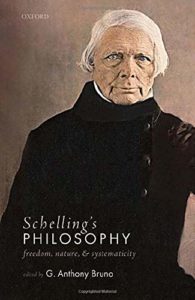DISCUSSIONI / Giulia Bernard

After longstanding neglect, towards the end of the twentieth century the issues tackled during the time stretching ‘von Kant bis Hegel’ have become relevant in the Anglophone reception. Several are the attempts to explore the philosophical project of those who escape from this teleology and can be traced back to the period known as ‘German idealism’ or, in a less distorting way, as ‘classical German philosophy’. Although it did not represent one of the first philosophies to experience a renaissance in English-speaking studies, there is no doubt that in recent decades the interest of interpreters is moving significantly towards F.W.J. Schelling’s thought.
The volume Schelling’s philosophy: Freedom, Nature and Systematicity edited by G. Anthony Bruno undoubtedly represents a turning point in this process of appropriation. The book collects twelve essays. Following a canonical periodization of Schelling’s thought, they are divided into four parts that trace the major phases of Schelling’s project. To his «early philosophy» are dedicated Essay 1 (on the Philosophical Letters on Dogmatism and Criticism) and Essay 2 (on On University Studies and his Würzburg Lectures). Essay 3 (on Ideas for a Philosophy of Nature, the On the World-Soul, and his First Outline for a System of the Philosophy of Nature), Essay 4 (on On the World-Soul), Essay 5 (on Presentation of My System of Philosophy), and Essay 6 (on Philosophy and Religion and Freedom Essay) address Schelling’s «philosophy of nature». Essay 7 (on Ideas for a Philosophy of Nature and the First Outline), Essay 8 (on Freedom Essay), Essay 9 (on First Outline and Freedom Essay), Essay 10 (on Ages of the World) are gathered under the label of «philosophy of freedom». Finally, his «late philosophy» is assessed in Essay 11 (on the On the Source of the Eternal Truths) and Essay 12 (on the 1833 Munich Lectures).
As the partial ‘overlapping’ of the commented texts reveals, the labels specifying multiple «phases» of Schelling’s philosophy, although legitimate, are far from univocal. They rather oversimplify a style of thinking which insists on some issues, changing with every opportunity to address them. For this reason, in discussing the contributes, we will follow the set of the arguments and questions rather than their chronological order of exposition.

